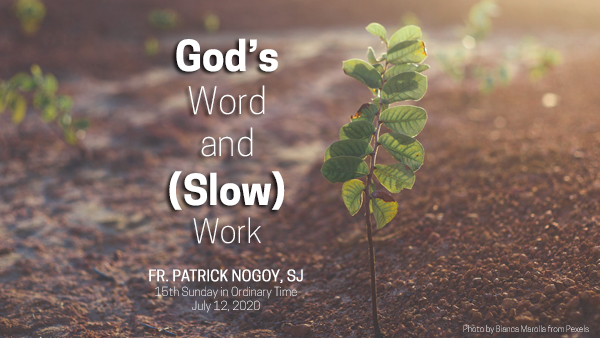


Fr. Patrick Nogoy, SJ
15th Sunday in Ordinary Time
July 12, 2020
God’s word is life and brings about life.
In the first reading, God’s word is associated with rain and snow—droplets full of life—and their efficacy in causing life through their watering of the earth. In the Gospel, Jesus uses a seed as analogy to God’s word. Seeds contain life and release it upon its firm planting on soil. Both analogies point to the reality of God’s word, a living and purposeful entity, and its mission is to make real what God wills. And following the theme of the readings today, God’s will is for us to have life and have it to the full.
We have been losing plenty of lives nowadays. The global crisis brought by the virus has taken away precious lives and have sown destruction and distraught in its path. In addition to this, some political leaders, through their word and deeds, have become means of perpetuating greater suffering and injustice that have drained life out in most of us. In all corners and parts of creation, we hear a deep and loud groaning. This is far from what St. Paul is describing in the second reading. Ours is a groaning for life whilst Paul points to the groaning of creation akin to a woman who is about to give birth. We are familiar with such pregnant grunt in our brave acts of kindness and courageous fight for justice. But that life-giving cry slowly drowns into a greater and miserable moaning—an amalgamation of frustration, helplessness, and anger. This is a more destructive groaning and we cry for life.
God’s word is life and brings about life.
Jesus reminds us that however life-giving the seed is, if the soil is not conducive enough to allow it to flourish, it would not yield fruit. This reminder teaches us at least three important thoughts: (1) God’s word, powerful and life-giving it may be, is open to the possibility of rejection, (2) such refusal does not negate its life-giving gifts and effects, and (3) the ill-effects of rejection would only multiply and consume the person who is totally inhospitable to God’s word. The reality of the fruitlessness of God’s word is a result of our refusal to allow it to take root in our lives and permit it to bear fruit.
God’s word is life and brings about life.
This is not a straightforward blame game. The difficult cases and stories are complex and they lie between total refusal and full acceptance. Plenty factors affect our receiving and keeping of God’s word, foremost of which are real day-to-day struggles of figuring out God’s will in the intricacies of the moral dilemmas we particularly face. It is not easy to judge who has a heart of thorns and thistles, rocks, or edgy paths. Sometimes, we develop thorns because of traumas we go through or we become as hard as rock due to the harshness of politics and life. Most will claim that they pray, hear God’s word, and make the best effort to let it grow in their behaviour and actions. It is impossible to draw straightforward conclusions without making presumptuous “holier than thou” commentaries. Perhaps, it is the whirlwind crisis and its punishing effects that push us to our limits of how much patience and fidelity to God’s word we can exhibit. In this hard reality of our groaning, maybe we can consider the reminder of our Lord as gentle consolation and hold it in the silent moments of recharging and coming home into prayer after a day’s battle: God’s word is life and brings about life.
This gentle consolation is not about giving up or spiritual escapism. I think that it is a timely comfort and fact that gives us reasons to confidently rise and act with patience, aware of the stage and situation we are in. It is having a feel of the pace of God’s work—it may be slow but it is sure. This reminds me of a prayer by Teilhard de Chardin and it may be good for us to reflect on it so to avoid falling into the urges of rejecting God’s word and giving Him up because our life situations as they stand now and as we ascertain them have not fallen into their proper places.
Patient Trust
Above all, trust in the slow work of God.
We are quite naturally impatient in everything to reach the end without delay.
We should like to skip the intermediate stages.
We are impatient of being on the way to something unknown, something new.
And yet it is the law of all progress
that it is made by passing through some stages of instability—
and that it may take a very long time.
And so I think it is with you;
your ideas mature gradually—let them grow,
let them shape themselves, without undue haste.
Don’t try to force them on,
as though you could be today what time
(that is to say, grace and circumstances acting on your own good will)
will make of you tomorrow.
Only God could say what this new spirit
gradually forming within you will be.
Give Our Lord the benefit of believing
that his hand is leading you,
and accept the anxiety of feeling yourself
in suspense and incomplete.